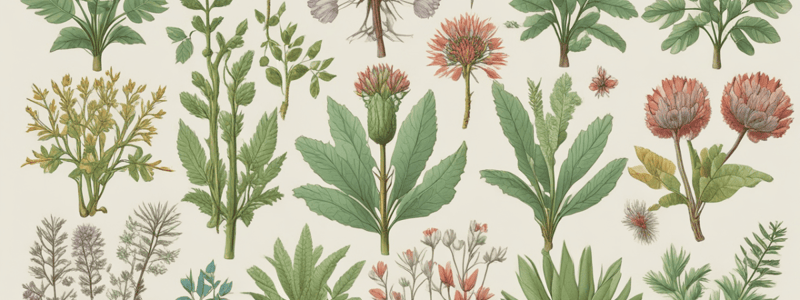Podcast
Questions and Answers
What is the primary function of photosynthesis in plants?
What is the primary function of photosynthesis in plants?
- To synthesize proteins for plant growth
- To store water in plant cells
- To produce oxygen for humans
- To convert light energy into chemical energy (correct)
What is the characteristic that distinguishes eukaryotic cells from prokaryotic cells?
What is the characteristic that distinguishes eukaryotic cells from prokaryotic cells?
- The ability to undergo photosynthesis
- The presence of a cell wall
- The presence of a nucleus and membrane-bound organelles (correct)
- The ability to move from one place to another
What is the byproduct of photosynthesis that is released by plants?
What is the byproduct of photosynthesis that is released by plants?
- Oxygen (correct)
- Glucose
- Carbon dioxide
- Water
What is the material that makes up the cell wall of plant cells?
What is the material that makes up the cell wall of plant cells?
What is the definition of autotrophs?
What is the definition of autotrophs?
What is the purpose of the cell wall in plant cells?
What is the purpose of the cell wall in plant cells?
What is the equation that represents the process of photosynthesis?
What is the equation that represents the process of photosynthesis?
What is the function of the cell wall in a plant?
What is the function of the cell wall in a plant?
What is the main difference between xylem and phloem in vascular tissue?
What is the main difference between xylem and phloem in vascular tissue?
What is a characteristic of nonvascular plants?
What is a characteristic of nonvascular plants?
What is the main advantage of flowers in angiosperms?
What is the main advantage of flowers in angiosperms?
What is the term for a seed leaf in a plant?
What is the term for a seed leaf in a plant?
What is a characteristic of monocot plants?
What is a characteristic of monocot plants?
What is the main difference between monocot and dicot plants?
What is the main difference between monocot and dicot plants?
Which of the following plants is an example of a gymnosperm?
Which of the following plants is an example of a gymnosperm?
Flashcards are hidden until you start studying
Study Notes
Overview of Plants
- Plants provide food, oxygen, and essential vitamins and minerals for human bodies.
- They are also a source of nutrients for other food animals like chicken, steak, and seafood.
Defining a Plant
- Plants are organisms that are photosynthetic, eukaryotic, and have cell walls.
- Photosynthesis is the process by which autotrophs convert light energy into chemical energy.
- The balanced reaction for photosynthesis is 6CO2 + 6H2O + light energy -> C6H12O6 + 6O2.
- Plants store glucose as food and release oxygen, which is used by organisms like humans.
Characteristics of Plant Cells
- Eukaryotic cells have a nucleus and membrane-bound organelles.
- Plant cells have cell walls, which are rigid layers around a cell.
- The cell wall is made up of a sugar called cellulose.
Classification of Plants
- Vascular plants have xylem and phloem, which transport water and nutrients throughout the plant.
- Xylem transports water and dissolved minerals, while phloem transports food.
- Nonvascular plants lack xylem and phloem, are small, simple, and less advanced.
Vascular Plants
- Examples of vascular plants include trees, grasses, and shrubs.
- Vascular plants can grow to be large due to the transport system.
Gymnosperms vs. Angiosperms
- Gymnosperms are vascular plants that do not produce flowers, but have seeds.
- Examples of gymnosperms include conifers and ginkgoes.
- Angiosperms are plants with flowers, which attract organisms for pollination.
- Examples of angiosperms include roses, apple trees, and magnolias.
Monocot vs. Dicot
- Angiosperms are categorized based on the number of seed leaves (cotyledons).
- Monocots have one seed leaf, while dicots have two seed leaves.
- Examples of monocots include grasses, corn, and palm trees.
- Examples of dicots include roses, sunflowers, cacti, and apple trees.
- Characteristics of monocots include single seed leaf, three flower petals, and parallel veined leaves.
- Characteristics of dicots include two seed leaves, four or five flower petals, and complex leaves.
Studying That Suits You
Use AI to generate personalized quizzes and flashcards to suit your learning preferences.




